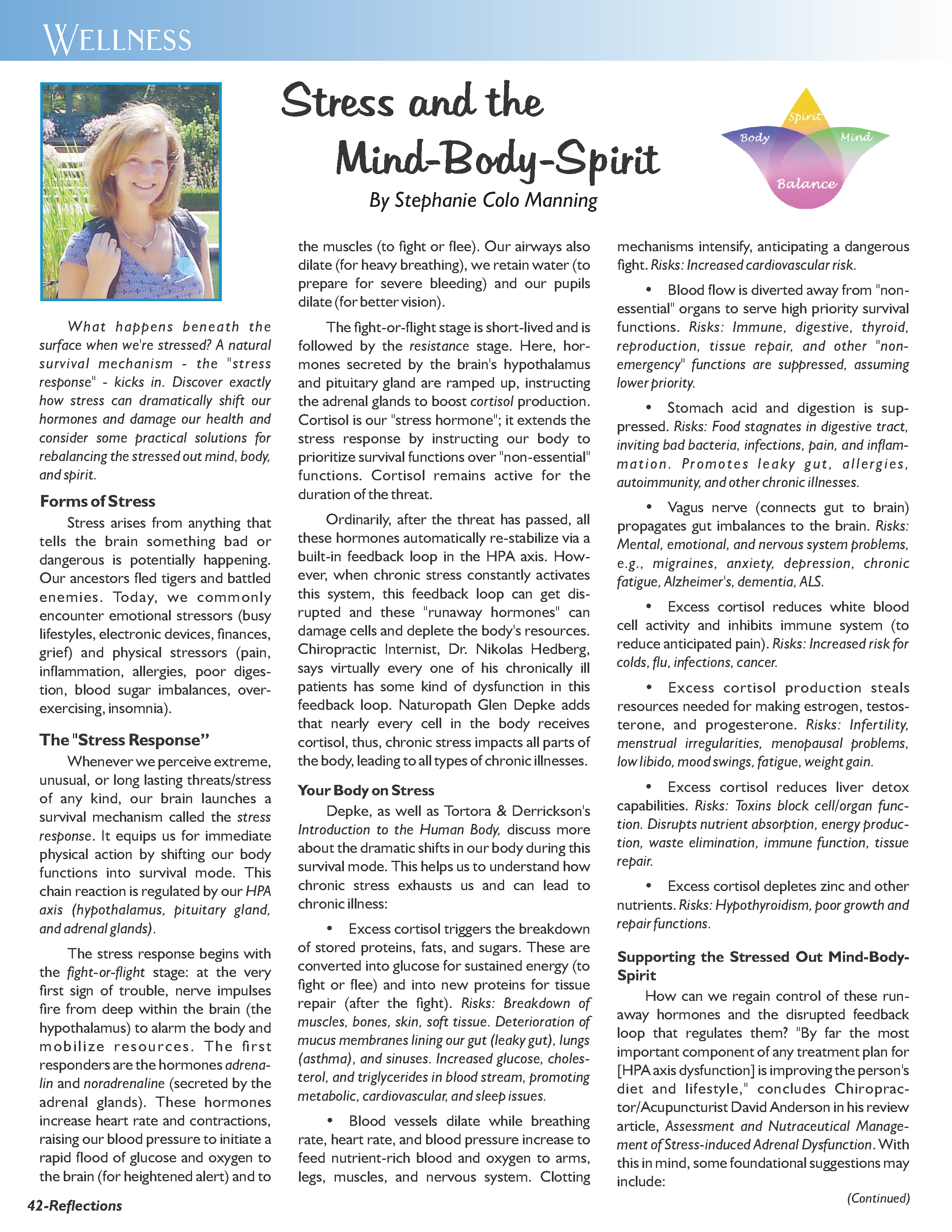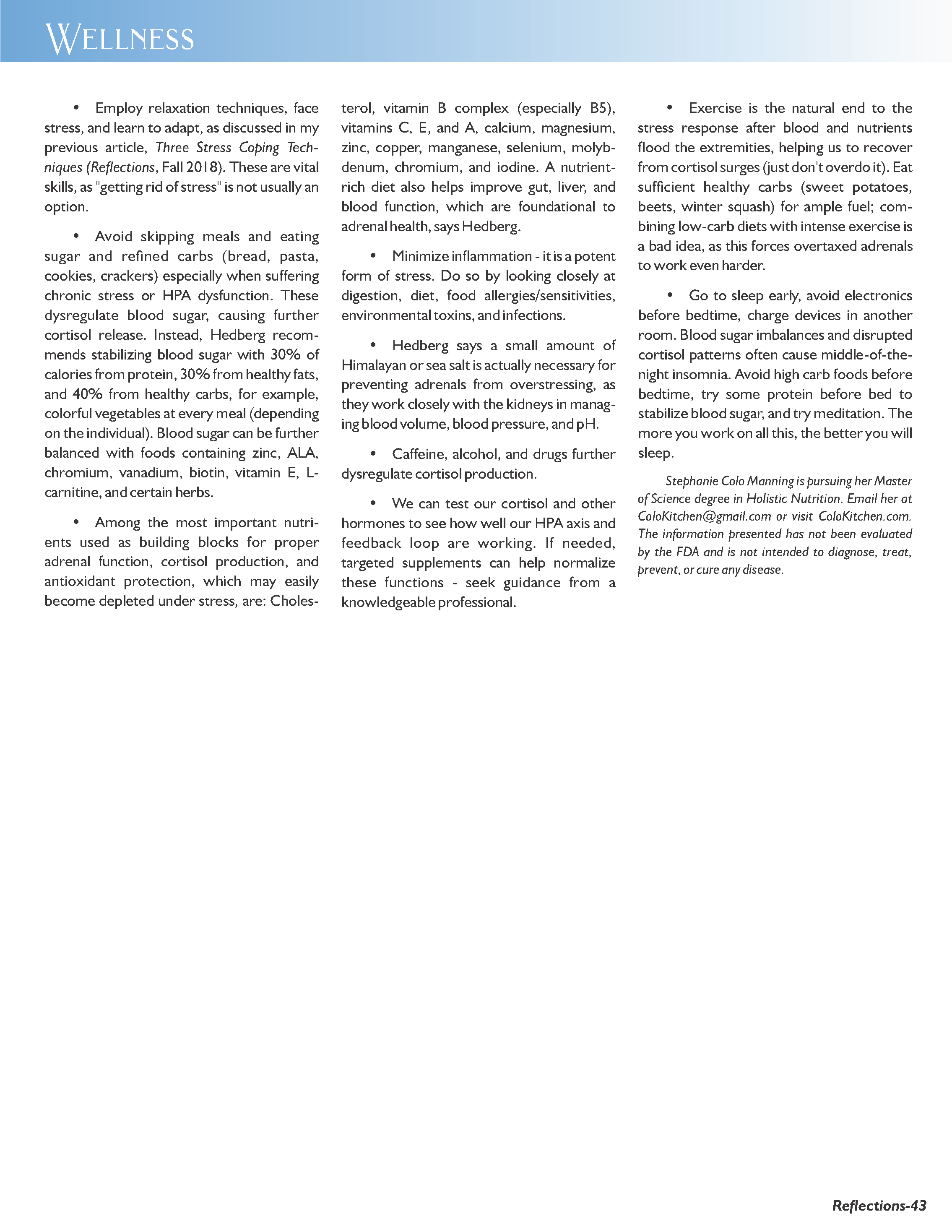Stress and the Mind-Body-Spirit, Winter 2018
By Stephanie Colo Manning
What happens beneath the surface when we’re stressed? A natural survival mechanism – the “stress response” – kicks in. Discover exactly how stress can dramatically shift our hormones and damage our health and consider some practical solutions for rebalancing the stressed out mind, body, and spirit.
Forms of Stress
Stress arises from anything that tells the brain something bad or dangerous is potentially happening. Our ancestors fled tigers and battled enemies. Today, we commonly encounter emotional stressors (busy lifestyles, electronic devices, finances, grief) and physical stressors (pain, inflammation, allergies, poor digestion, blood sugar imbalances, over-exercising, insomnia).
The “Stress Response”
Whenever we perceive extreme, unusual, or long lasting threats/stress of any kind, our brain launches a survival mechanism called the stress response. It equips us for immediate physical action by shifting our body functions into survival mode. This chain reaction is regulated by our HPA axis(hypothalamus, pituitary gland, and adrenal glands).
The stress response begins with the fight-or-flight stage: at the very first sign of trouble, nerve impulses fire from deep within the brain (the hypothalamus) to alarm the body and mobilize resources. The first responders are the hormones adrenalinand noradrenaline(secreted by the adrenal glands). These hormones increase heart rate and contractions, raising our blood pressure to initiate a rapid flood of glucose and oxygen to the brain (for heightened alert) and to the muscles (to fight or flee). Our airways also dilate (for heavy breathing), we retain water (to prepare for severe bleeding) and our pupils dilate (for better vision).
The fight-or-flight stage is short-lived and is followed by the resistancestage. Here, hormones secreted by the brain’s hypothalamus and pituitary gland are ramped up, instructing the adrenal glands to boost cortisolproduction. Cortisol is our “stress hormone”; it extends the stress response by instructing our body to prioritize survival functions over “non-essential” functions. Cortisol remains active for the duration of the threat.
Ordinarily, after the threat has passed, all these hormones automatically re-stabilize via a built-in feedback loop in the HPA axis. However, when chronic stress constantly activates this system, this feedback loop can get disrupted and these “runaway hormones” can damage cells and deplete the body’s resources. Chiropractic Internist, Dr. Nikolas Hedberg, says virtually every one of his chronically ill patients has some kind of dysfunction in this feedback loop. Naturopath Glen Depke adds that nearly every cell in the body receives cortisol, thus, chronic stress impacts all parts of the body, leading to all types of chronic illnesses.
Your Body on Stress
Depke, as well as Tortora & Derrickson’s Introduction to the Human Body, discuss more about the dramatic shifts in our body during this survival mode. This helps us to understand how chronic stress exhausts us and can lead to chronic illness:
Excess cortisol triggers the breakdown of stored proteins, fats, and sugars. These are converted into glucose for sustained energy (to fight or flee) and into new proteins for tissue repair (after the fight). Risks: Breakdown of muscles, bones, skin, soft tissue. Deterioration of mucus membranes lining our gut (leaky gut), lungs (asthma), and sinuses. Increased glucose, cholesterol, and triglycerides in blood stream, promoting metabolic, cardiovascular, and sleep issues.
- Blood vessels dilate while breathing rate, heart rate, and blood pressure increase to feed nutrient-rich blood and oxygen to arms, legs, muscles, and nervous system. Clotting mechanisms intensify, anticipating a dangerous fight. Risks: Increased cardiovascular risk.
- Blood flow is diverted away from “non-essential” organs to serve high priority survival functions. Risks: Immune, digestive, thyroid, reproduction, tissue repair, and other “non-emergency” functions are suppressed, assuming lower priority.
- Stomach acid and digestion is suppressed. Risks: Food stagnates in digestive tract, inviting bad bacteria, infections, pain, and inflammation. Promotes leaky gut, allergies, autoimmunity, and other chronic illnesses.
- Vagus nerve (connects gut to brain) propagates gut imbalances to the brain. Risks: Mental, emotional, and nervous system problems, e.g., migraines, anxiety, depression, chronic fatigue, Alzheimer’s, dementia, ALS.
- Excess cortisol reduces white blood cell activity and inhibits immune system (to reduce anticipated pain). Risks:Increased risk for colds, flu, infections, cancer.
- Excess cortisol production steals resources needed for making estrogen, testosterone, and progesterone. Risks: Infertility, menstrual irregularities, menopausal problems, low libido, mood swings, fatigue, weight gain.
- Excess cortisol reduces liver detox capabilities. Risks: Toxins block cell/organ function. Disrupts nutrient absorption, energy production, waste elimination, immune function, tissue repair.
- Excess cortisol depletes zinc and other nutrients. Risks: Hypothyroidism, poor growth and repair functions.
Supporting the Stressed Out Mind-Body-Spirit
How can we regain control of these runaway hormones and the disrupted feedback loop that regulates them? “By far the most important component of any treatment plan for [HPA axis dysfunction] is improving the person’s diet and lifestyle,” concludes Chiropractor/Acupuncturist David Anderson in his review article, Assessment and Nutraceutical Management of Stress-induced Adrenal Dysfunction. With this in mind, some foundational suggestions may include:
- Employ relaxation techniques, face stress, and learn to adapt, as discussed in my previous article, Three Stress Coping Techniques(Reflections,Fall 2018). These are vital skills, as “getting rid of stress” is not usually an option.
- Avoid skipping meals and eating sugar and refined carbs (bread, pasta, cookies, crackers) especially when suffering chronic stress or HPA dysfunction. These dysregulate blood sugar, causing further cortisol release. Instead, Hedberg recommends stabilizing blood sugar with 30% of calories from protein, 30% from healthy fats, and 40% from healthy carbs, e.g., colorful vegetables at every meal (depending on the individual). Blood sugar can be further balanced with foods containing zinc, ALA, chromium, vanadium, biotin, vitamin E, L-carnitine, and certain herbs.
- Among the most important nutrients used as building blocks for proper adrenal function, cortisol production, and antioxidant protection, which may easily become depleted under stress, include: Cholesterol, vitamin B complex (especially B5), vitamins C, E, and A, calcium, magnesium, zinc, copper, manganese, selenium, molybdenum, chromium, and iodine. A nutrient-rich diet also helps improve gut, liver, and blood function, which are foundational to adrenal health, says Hedberg.
- Minimize inflammation – it is a potent form of stress. Do so by looking closely at digestion, diet, food allergies/sensitivities, environmental toxins, and infections.
- Hedberg says a small amount of Himalayan or sea salt is actually necessary for preventing adrenals from overstressing, as they work closely with the kidneys in managing blood volume, blood pressure, and pH.
- Caffeine, alcohol, and drugs further dysregulate cortisol production.
- We can test our cortisol and other hormones to see how well our HPA axis and feedback loop are working. If needed, targeted supplements can help normalize these functions – seek guidance from of a knowledgeable professional.
- Exercise is the natural end to the stress response after blood and nutrients flood the extremities, helping us to recover from cortisol surges (just don’t overdo it). Eat sufficient healthy carbs (sweet potatoes, beets, winter squash) for ample fuel; combining low-carb diets with intense exercise is a bad idea, as this forces overtaxed adrenals to work even harder.
- Go to sleep early, avoid electronics before bedtime, charge devices in another room. Blood sugar imbalances and disrupted cortisol patterns often cause middle-of-the-night insomnia. Avoid high carb foods before bedtime, try some protein before bed to stabilize blood sugar, and try meditation. The more you work on all this, the better you will sleep.
Stephanie Colo Manning holds a Master of Science degree in Holistic Nutrition. The information presented has not been evaluated by the FDA and is not intended to diagnose, treat, prevent, or cure any disease. References available upon request.


